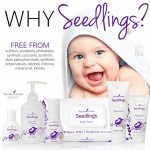Baby wipes increase children’s risk of developing life-threatening food allergies.
Immune reactions to everyday produce like nuts, eggs and soy may be brought on by a ‘perfect storm’ of baby wipes, dust and food exposure, a study found.
Researchers believe this is due to an ingredient in soap found in baby wipes, known as sodium lauryl sulphate, lingering on infants’ skin and disrupting its protective fatty barrier, reports Daily Mail.
In youngsters with genetic mutations that predispose them to allergies, this disruption could lead to immune reactions if they are, for instance, kissed by a sibling with peanut butter on their face, according to the US researchers.
The scientists recommend parents reduce their youngsters’ food allergy risk by washing their hands before touching them and rinsing off excess soap after baby wipe use.
Around one in 13 children in the US suffer from at least one food allergy, according to Food Allergy Research & Education.
Professor Cook-Mills then investigated skin studies that assessed the impact of soap, saying: ‘I thought “oh my gosh!’ That’s infant wipes!”‘
After the study’s mice were exposed to food and dust on their skin three-to-four times for 40 minutes over two weeks, they were given pieces of egg or peanuts to eat.
As a result, the animals suffered allergic reactions at the site of skin exposure, as well as in their intestines.
Their body temperatures also fell, which indicates the severe food allergy anaphylaxis.
Professor Cook-Mills added: ‘It’s a major advance in our understanding of how food allergy starts early in life.’
Speaking of how parents can lower their children’s risk of such reactions, Professor Cook-Mills said: ‘Reduce baby’s skin exposure to food allergens by washing your hands before handling the baby.
‘Limit use of infant wipes that leave soap on the skin. Rinse soap off with water like we used to do years ago. ‘
On the back of the findings, the researchers plan to carry out further studies investigating how food allergies can be prevented in children.
The findings were published in the Journal of Allergy and Clinical Immunology.
Share your comments below.




















-

-
-
meedee said
- 04 Jul 2022
-

-
-
tessie said
- 16 Apr 2018
-

-
-
shuttles54 said
- 12 Apr 2018

-

-
-
mellissajoy said
- 12 Apr 2018
-

-
-
ella12 said
- 11 Apr 2018
-

-
-
rovermum said
- 11 Apr 2018
-

-
-
sars_angelchik said
- 11 Apr 2018
-

-
-
musicmum said
- 11 Apr 2018
-

-
-
mom160421 said
- 10 Apr 2018
-

-
-
nadine_hill said
- 10 Apr 2018
-

-
-
Ellen said
- 10 Apr 2018

-

-
-
june11 said
- 09 Apr 2018
-

-
-
Amanda Holland said
- 09 Apr 2018
-

-
-
mom206279 said
- 09 Apr 2018
-

-
-
becstalou said
- 09 Apr 2018
-

-
-
mom90758 said
- 09 Apr 2018
Post a comment9:25 am
12:33 pm
11:52 pm
10:46 am
2:22 pm
10:09 am
9:35 am
12:54 am
10:40 am
9:24 am
7:54 am
11:22 pm
-

-
-
not_amanda replied
- 10 Apr 2018 , 8:44 pm
Reply9:03 pm
7:47 pm
1:42 pm
-

-
-
Lily replied
- 09 Apr 2018 , 8:03 pm
Reply1:22 pm
To post a review/comment please join us or login so we can allocate your points.